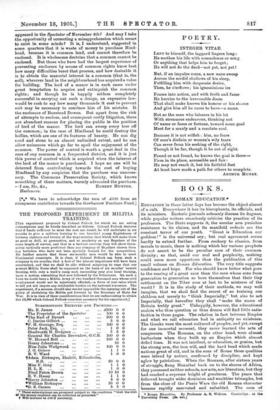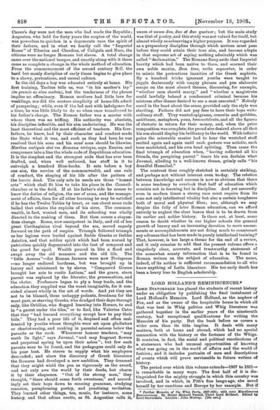ROMAN EDUCATION.* EDUCATION in these latter days has become the
object almost of a cult. Everywhere it has its hierophants, its officials, and its ministers. Esoteric journals solemnly discuss its dogmas, while popular writers ceaselessly criticise the practice of its professors. The State supports it, the secular arm punishes resistance to its claims, and its manifold ordeals are the constant terror of our youth. "Great is Education our goddess !" is the universal cry ; but real agreement seems hardly to extend further. From cookery to classics, from morals to music, there is nothing which her various prophets do not assert to be the peculiar care of their common divinity ; so that, amid our zeal and perplexity, nothing could seem more opportune than the publication of this small volume on Roman Education. The very title suggests confidence and hope. For who should know better what goes to the rearing of a great race than the men whose sons from generation to generation so bore themselves that their tiny settlement on the Tiber rose at last to be mistress of the world P It is in the study of their methods, we may well imagine, that we shall find the secret of so training our children not merely to "think Imperially," but also to act Imperially, that hereafter they shall "make the name of Britain trebly great." Unhappily, however, the educational zealots who thus question or thus dream will find little satis- faction in these pages. The relation in fact between Empire and what we call education bad in antiquity no existence. The Greeks were the most cultured of peoples, and yet, except for one immortal moment, they never learned the arts of conquerors. The Romans, on the other hand, were almost barbarians when they built up an Empire which almost defied time. It was not intellect, or education, or genius, but the strong arm, the iron will, and the hard head which made nations great of old, and in the sons of Rome these qualities were inbred by nature, confirmed by discipline, and kept aglow by patriotism. When the Romans, after sixteen years of struggle, flung Hannibal back on to the shores of Africa, they possessed neither schools, nor arts, nor literature, but they had reached a supreme height of greatness. The years that followed brought wider dominion and wealthier triumphs, but from the close of the Punic Wars the old Roman character became rapidly enervated and enfeebled. The men of • Roman Education. By Professor A. S. Wilkins. Cambridge : at the University Press. pa net.] Cicero's day were not the men who had made the Republic ; Augustus, who held for forty years the sceptre of the world, was powerless to quicken in a degenerate race the spirit of their fathers, and in what we fondly call the "Imperial Rome" of Tiberius and Claudius, of Caligula and Nero, the citizens were no longer Romans but slaves. A total change came over the national temper, and exactly along with it there came as complete a change in the whole method of education. From the commencement of the second century B.C. the hard but manly discipline of early times begins to give place to a showy, pretentious, and unreal culture.
In the old days a boy was educated entirely at home. His first training, Tacitus tells us, was "in his mother's lap" (in gremio ac sinu matris), but the tenderness of the phrase implies no effeminacy. Roman mothers had little love for weaklings, nor did the austere simplicity of home-life admit of pampering ; while, even if the lad met with indulgence for a time, he was little likely to do so when once transferred to his father's charge. The Roman father was a master with whom there was no trifling. His authority was absolute, his discipline inflexible, and his aim undeviating. He was the least theoretical and the most efficient of teachers. His fore- fathers, he knew, had by their character and conduct made the State what it was, and such as they had been he was resolved that his sons and his sons' sons should be likewise. Moribus antiquis stat res Romatza tririsque, says Ermine, and compresses into a line the whole code of Republican education. It is the simplest and the strongest code that has ever been drafted, and, when well enforced, has stuff in it to outweigh a hundred Blue-books. It sets before a boy one aim, the service of the commonwealth, and one rule of conduct, the shaping of his life after the pattern of the heroic dead. The only arts he needs are those "honest arts" which shall fit him to take his place in the Council- chamber or in the field. If at his father's side he comes to know the duties of religion, the use of arms, and the manage- ment of affairs, then for all other learning he may be satisfied if be has the Twelve Tables by heart, or can chant some rude ballad that relates the exploits of his sires. The common- wealth, in fact, wanted men, and its schooling was wholly directed to the making of them. But then comes a stupen- dous change. Rome, now omnipotent in Italy, and rid of her great Carthaginian rival beyond the sea, moved eagerly forward on the path of empire. Triumph followed triumph as her legions were hurled against feeble Greeks or feebler Asiatics, and that soldier spirit which h-ad been nursed by patriotism quickly degenerated into the lust of conquest and the greed for spoil. Wealth poured in like a flood and swept away the old manners and the old life. The "little Aeneas"—for Roman farmers were now Troiugenae —no longer endured hardness, but was brought up in luxury and ministered to by slaves. "Conquered Greece brought her arts to rustic Latium," and the grave, stern parent was replaced by the literator, the grammaticus, and the rhetor. Professors began to ply a busy trade, and the education they supplied was the worst imaginable, for it con- sisted almost wholly in the art of words. And yet they are not to be blamed, these unhappy pedants, freedmen for the most part, or starving Greeks, who drudged their days through only, like Orbilius, who flogged learning into Horace, to end in"a garret under the tiles," or to find, like Valerius Cato, that they "had learned everything except how to pay their bills." They had a poor life of it, despised and often mal- treated by youths whose thoughts were set upon gladiators or chariot-racing, and ranking in parental esteem below the parasite or the cook. Whosoever honour teachers, "may earth lie light," says Juvenal, "and may fragrant flowers and perpetual spring be upon their ashes "; but few such parents were to be found, and the pedagogue could only do his poor best. He strove to supply what his employers demanded ; and since the discovery of Greek literature the Romans had developed a new ambition. They dreamed that they might wield the pen as vigorously as the sword, and not only awe the world by their deeds, but charm it by their eloquence. "Out of the strong man," they thought, "there should come forth sweetness," and accord- ingly set their boys down to conning grammar, studying scansion, paraphrasing poetry, and practising recitation They learned other things, too, music, for instance, some history, and that odiosa cantio, as St. Augustine calls it,
unum et unum duo, duo et duo quatuor ; but the main study was that of poetry, and this study was not valued for itself, but almost wholly as subserving a higher purpose. It was regarded as a preparatory discipline through which novices must pass before they could attain their true aim, and become adepts in that supreme art of saying nothing admirably which was called "declamation." The Romans flung aside that Imperial brevity which had been native to them, and scorned their own noble maxim, Rem tene, verba sequentur, in order to mimic the pretentious inanities of the Greek sophists. By a hundred tricks ignorant youths were taught to juggle dexterously with empty phrases and pen elaborate essays on the most absurd themes, discussing, for example, "whether men should marry," and "whether a magistrate could lawfully behead a condemned criminal because his mistress after dinner desired to see a man executed." Nobody cared in the least about the sense, provided only the style was startling. Fathers did not pay fees to have their boys write ordinary stuff. They wanted epigrams, conceits and quibbles, antitheses, metaphors, puns, homoeoteleuta, and all the figures of rhetoric in return for their money, and, when the prize composition was complete, the proud sire desired above all that his son should display his brilliancy to the world. With infinite pains the miserable master had to bear the wretched stuff recited again and again until each gesture was artistic, each tone modulated, and his own head splitting. Then came the final triumph of education when, "having collected all his friends, the perspiring parent" hears his son declaim what Juvenal, alluding to a well-known theme, grimly calls "his dreadful Hannibal."
The contrast thus roughly sketched is certainly striking, and perhaps not without interest even to-day. The relation between knowledge and success is now so obvious that there is some tendency to overlook that half of education which consists not in learning but in discipline. And yet aseuredly even in modern times a strong race must require from its sons not only intellectual vitality but also a certrain toughness both of moral and physical fibre ; nor, although we may despise the folly of later Roman education, can we afford entirely to neglect the clear lesson that is to be drawn from its earlier and nobler history. IS there not, at least, some reason to doubt whether in our higher schools the general growth of luxury and an increasing devotion to mere amuse- ments or accomplishments are not doing much to counteract any advance that has been made in purely intellectual training ? That, however, is too large a theme for the end of a review, and it only remains to add that the present volume offers a singularly clear, accurate, and trustworthy statement of the somewhat scanty information that is to be found in Roman writers on the subject of education. The name, indeed, of its author is sufficient recommendation to all who know anything of Latin literature. His too early death has been a heavy loss to English scholarship.



































































 Previous page
Previous page